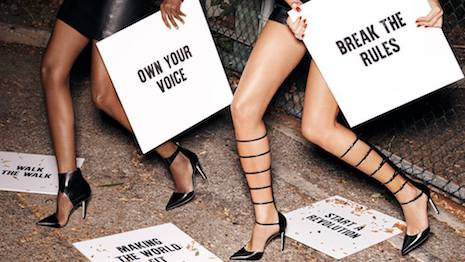- About
- Subscribe Now
- New York,
April 26, 2018

 Tamara Mellon aligned itself with the Women's March. Image credit: Tamara Mellon
Tamara Mellon aligned itself with the Women's March. Image credit: Tamara Mellon
Recognizing the power they have to make a difference, prominent brands and personalities in the fashion industry are throwing their support behind causes.
According to a new report from Fashionbi, both protests and activism are on the rise around the world as the conversations around issues such as climate change, immigration and gender inequality heat up. Within this environment, the fashion industry is taking an active role through charitable partnerships and awareness campaigns.
“The fashion industry is a mirror of the time we are living,” said Yana Bushmeleva, chief operating officer at Fashionbi, Milan. “Nowadays, people more than ever before are concerned about such issues as sustainable living, equal rights, politics or discrimination.
“As the result, some brands decided to support such moods of the customers, the question is if such social activism is just a marketing strategy or a true position of the brand?"
Because of social media, any individual is now connected to the rest of the world. Social networks also give consumers a platform to share their thoughts to a broader audience.
Digitally native millennials are particularly socially conscious and active, using social media to voice their support or concerns.
In the U.S. alone, issues such as women’s rights, immigration, racial equality and climate concerns have spurred consumers to protest.
Fashion brands are getting in on the action.
Gucci showed its support for gun control. Image credit: Gucci
Gucci took a position in the gun control debate happening in the United States by pledging $500,000 to the March for Our Lives Rally in March (see story). Despite being a polarizing issue, other fashion brands including Kenneth Cole and Rebecca Minkoff also aligned themselves with those fighting for stricter gun laws.
Since the Trump administration first issued a travel ban for a number of Muslim-majority nations in January 2017, there have been hundreds of protests. Among those hitting the streets were supermodel sisters Gigi and Bella Hadid.
Women’s rights have also been a key topic, fueled by political policies and the #MeToo movement.
As the Women’s March took place around the U.S. and the world, brands including Missoni and Tamara Mellon linked themselves to the movement. Tamara Mellon invited followers to post photos of themselves at the protest, while Missoni sent luxe versions of the pink pussy hats worn by protesters down its runway.
For Missoni, fall/winter 2017 models wore pink pussy hats. Image credit: Missoni
Brands also responded to the focus on feminism with their creations. Dior’s Maria Grazia Chiuri is among the designers who created pro-feminism slogan T-shirts to further the conversation around women’s empowerment.
On the runway, brands have embraced greater diversity and inclusivity. For instance, Sudanese model Anok Yai recently became the first black model to open a Prada show since Naomi Campbell in 1997.
Hijabi model Halima Aden has walked in shows for brands including Max Mara and Kanye West’s Yeezy, changing the game as the first Muslim model choosing to dress modestly while working.
The fashion industry is also looking to change modeling for the better after allegations of abuse and harassment.
Kering and LVMH signed a charter in 2017 that lays out guidelines for model treatment and well-being (see story).
As models came forward with stories of harassment from photographers or other industry professionals, some brands took a stand by cutting ties. For instance, Condé Nast International decided it would no longer work with Terry Richardson (see story).
Among those who have been accused of improper conduct are Patrick Demarchelier and Bruce Weber.
Fashion brands have also used their voices and positions to support LGBTQ+ rights.
Christopher Bailey supported LGBTQ+ individuals with his final Burberry show. Image courtesy of Burberry
Designer Christopher Bailey’s final collection for Burberry was dedicated to organizations that provide outreach for LGBTQ+ individuals. Included within the collection was a new rainbow version of Burberry’s iconic check pattern, a reference to the symbol of gay pride (see story).
Taking up social causes can be a risky move.
"If such social activism from brand's side wasn't seriously planned and executed the risk is to have a superficial campaign with zero impact," Fashionbi's Ms. Bushmeleva said. "Another risk is to launch social activism campaign when the customers of the brand do not really share those values which the brand is trying to defend or simply do not have an interest in the topic.
"At the same time, if the brand works in particular niche and among its pillars the social activism plays a crucial role such activities are a big opportunity for the brand to involve its customers in its social actions."
Environmental efforts
Along with social causes, brands have also taken up positions on environmental issues.
For instance, U.S. jeweler Tiffany & Co. turned to its fashionable friends during New York Fashion Week to lend its support to the Elephant Crisis Fund (ECF).
Tiffany teamed with model Doutzen Kroes, who serves as the global ambassador for ECF, for the second #KnotOnMyPlanet campaign. The campaign objective is to raise support and awareness for the work of the ECF, whose mission is to stop elephant poaching and end the global demand of ivory (see story).
French fashion label Kenzo similarly has an ongoing campaign with Blue Marine Foundation, which takes aim at overfishing (see story).
"Personally, I believe in those brands, which were involved in the social activism for quite a long time and not simply launch a one-term project," Ms. Bushmeleva said. "For example, the Patagonia company is famous for its actions towards sustainable living and consumption, as well as Stella McCartney.
"The others can learn to stay true to the social values that once were publicly announced by the company and somehow involve the customers in practical actions."
Share your thoughts. Click here